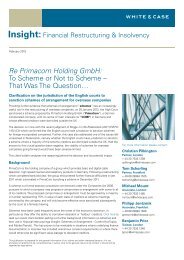Mexican Legal Framework of Business Insolvency - White & Case
Mexican Legal Framework of Business Insolvency - White & Case
Mexican Legal Framework of Business Insolvency - White & Case
Create successful ePaper yourself
Turn your PDF publications into a flip-book with our unique Google optimized e-Paper software.
30, 31, 32, 33, 34, 35, 36, 37, 38, 39, 40 and 41 contained in Chapter IV <strong>of</strong> Title First <strong>of</strong><br />
such [<strong>Insolvency</strong>] Law, it is inevitably concluded that the legislator foresaw two cases for<br />
recognition <strong>of</strong> foreign proceedings: the first, when the foreign proceeding to be recognized<br />
refers to a debtor that has an establishment in Mexico, a case in which it is effectively<br />
required that the concurso <strong>of</strong> such debtor begins in accordance with the <strong>Insolvency</strong> Law and,<br />
once the confirmatory visit provided in such [<strong>Insolvency</strong>] Law is carried out, the concurso<br />
judgment is passed and at that same time the foreign proceeding is recognized. That is, the<br />
recognition <strong>of</strong> a foreign proceeding <strong>of</strong> a debtor that has an establishment in Mexico assumes<br />
the need to open the concurso <strong>of</strong> such debtor under which the verification visit must be<br />
carried out, judgment is passed declaring the debtor en concurso, and then the foreign<br />
proceeding is recognized….<br />
This is probably the main obstacle presented by the <strong>Insolvency</strong> Law, which<br />
completely neutralizes all benefits <strong>of</strong> the Model Law for expedited recognition.<br />
Basically, a recognition procedure is converted into a main proceeding with all the<br />
costs and delays associated with it. It is hard to understand why Mexico took this<br />
position when drafting the cross-border cooperation provisions.<br />
iii. Recognition<br />
A foreign proceeding will be recognized (1) as a foreign main proceeding, if it is<br />
taking place in a state where the debtor has the center <strong>of</strong> its main interests; or<br />
(2) as a foreign non-main proceeding, if the debtor has an establishment in the<br />
foreign state [LCM 296].<br />
It is worth noting that the <strong>Insolvency</strong> Law failed to incorporate UML 17(3), which<br />
states that [a]n application for recognition <strong>of</strong> a foreign proceeding shall be decided<br />
upon at the earliest possible time. This omission reinforces the argument that<br />
the <strong>Insolvency</strong> Law has completely neutralized the benefits <strong>of</strong> the Model Law for<br />
expedited recognition (cfr. 18.g.ii).<br />
<strong>White</strong> & <strong>Case</strong><br />
93
















